Sustainable eCommerce fulfillment solutions
In 2020, fuelled by the Covid-19 pandemic, global eCommerce sales soared to $26.7 trillion. In addition to the strains on the global supply chain this increase in online sales has caused, the impacts of the eCommerce industry on the environment have been catastrophic. From unsustainable packaging solutions and landfill waste to the significant carbon emissions generated by shipping products all over the world, the eCommerce market struggles with sustainability.
Autofulfil provides a sustainable solution for eCommerce fulfillment strategies. From receiving your products to the returns process and beyond, we make every effort to reduce waste, improve sustainability, and minimise the carbon impact of your brand. As a leading fulfillment provider, we’re committed to cost-effective, eco-friendly product fulfillment for customers throughout Ireland, Europe, and around the globe – and you can join them in as little as a week!
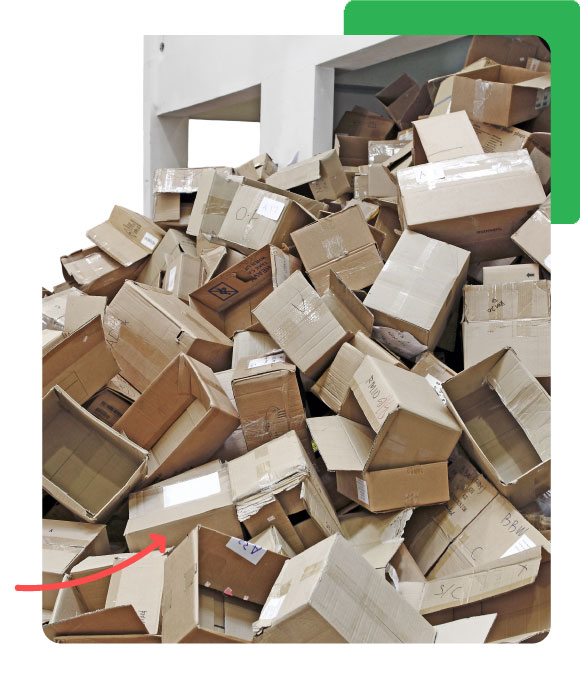

The Need for Eco-Friendly Packaging
Forget product manufacturing – the greatest share of greenhouse gas emissions in the eCommerce industry comes from the production of packaging for eCommerce orders, at 45%. Every year, 3 billion trees are pulped to produce 241 million tons of shipping boxes for packaging. And less than 14% of the 86 million tons of plastic packaging produced around the world is actually recycled, so it’s far from environmentally friendly.
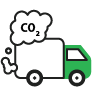
Carbon Emissions from Shipping
On top of packaging, the need to ship orders is also a major contributor to the CO2 emissions generated by the eCommerce industry. Shipping and global eCommerce returns accounts for 37% of eCommerce greenhouse gas emissions. The rising demand for faster eCommerce deliveries requiring the use of air transportation to cover large distances in less time is pushing the share of logistics emissions even higher. By 2030, emissions for eCommerce businesses’ product deliveries are expected to increase by another 30%.
Consumer demand for sustainable fulfillment is growing
Sustainable, fair-trade, vegan, cruelty-free, durable, and environmentally-friendly products are becoming increasingly popular with eCommerce customers.
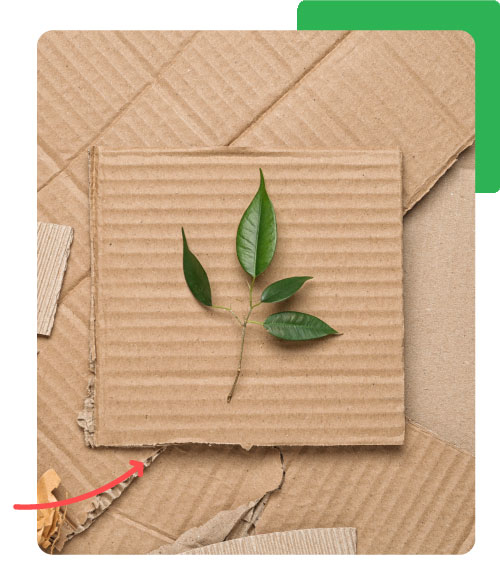
Research in 2018 found that products marketed as sustainable solutions sold for more compared to the category average. For example, in the study, sustainable chocolates had a 16% increase in sales, compared to only 5% for all other chocolates.
In Ireland, 41% of shoppers said they are willing to pay a premium for more eco-friendly, sustainable products, and 49% said they want to buy products with less packaging.
Another survey showed that 61% of customers are happy to wait longer to receive an order delivery if they know it will have less of an impact on the environment. That could be aggregating orders or reducing environmental harm with different delivery vehicles, for example.
Moreover, 84% of customers said they would be more likely to make a purchase based on a brand’s positive sustainability practices. This might include eco-friendly materials for packaging, sustainable fulfillment partners, or a range of other factors.
In Ireland, 41% of shoppers said they are willing to pay a premium for more sustainable products, and 49% said they want to buy products with less packaging.
Another survey showed that 61% of consumers are happy to wait longer to receive an order delivery if they know it will be better for the environment, and 84% said they would be more likely to make a purchase based on a brand’s positive sustainability practices.
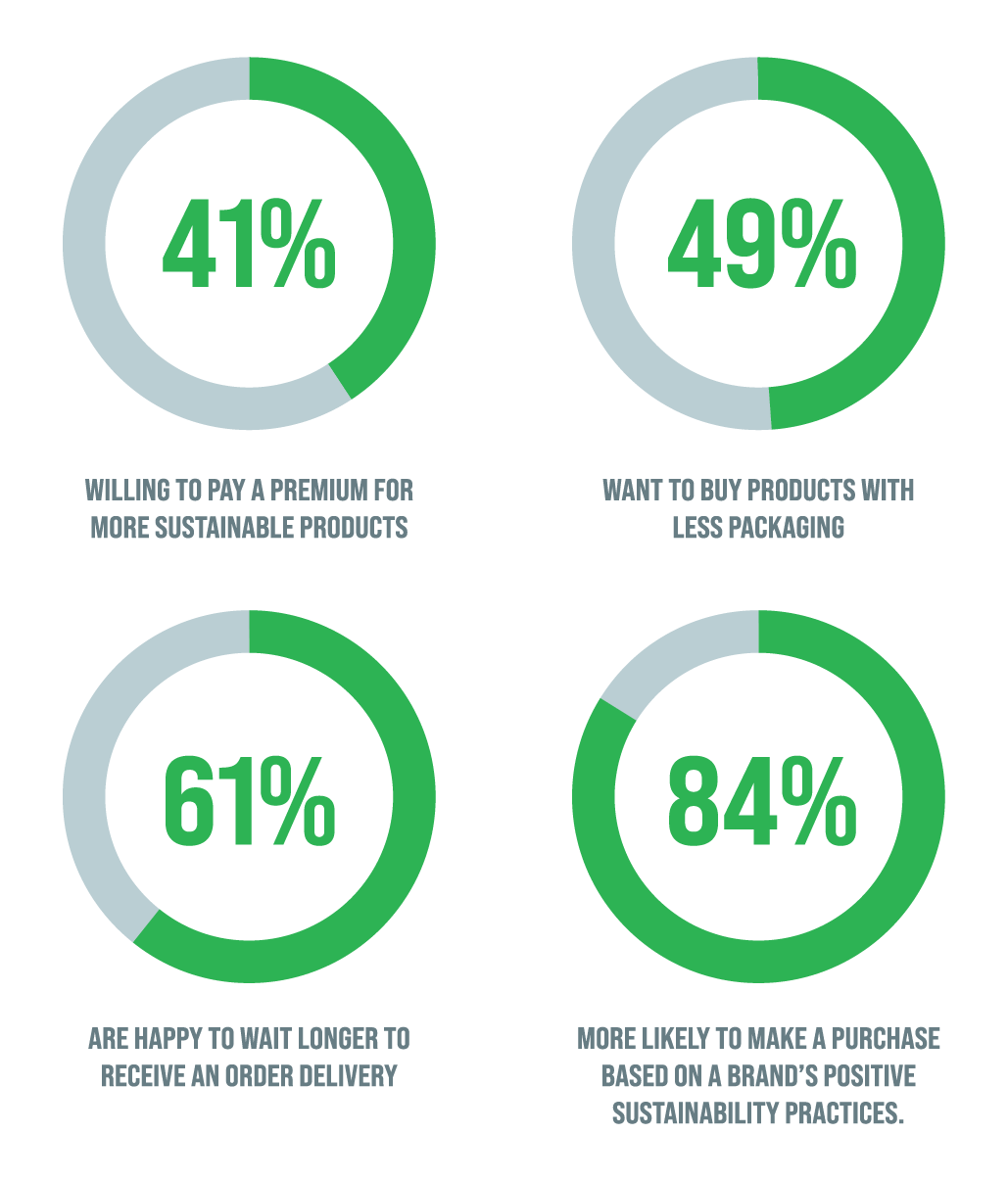
How Autofulfil can help eCommerce brands be more sustainable?
It’s clear that online customers want to buy from eCommerce brands that are selling sustainable products with a sustainable supply chain and eco-friendly logistics. But how can your brand improve its sustainability to attract and retain customers? With Autofulfil, you can significantly boost your eCommerce store’s environmental impact by utilising our fully sustainable order fulfillment process.

Circular Economy Initiatives
Autofulfil actively champions circular economy initiatives that extend product lifecycles to reduce waste by encouraging reuse and recycling. This includes customer return programmes and repurposing partnerships.
Sustainable packaging materials
We use biodegradable, paper-based, recyclable packaging when picking and packing orders, including paper void fill and paper tape. Our cardboard boxes have been produced with sustainable forest management practices that have been certified by the Forest Stewardship Council (FSC). We also have processes in place to select the least amount of packing materials required – and all plastic and paper waste is segregated and recycled at our facilities.

Carbon-Neutral Fulfillment
Our 100,000 sq. ft. eCommerce fulfillment centre is lit by motion-sensing LED lights to reduce energy consumption, and is powered by 65.3% renewable energy with plans in place for a solar farm development at our Fisher town facility. We plant trees to offset the carbon emissions produced from our packaging production, warehouse energy consumption, and even when our employees travel to and from our facilities.

Carbon-Neutral Shipping Process
We also plant trees to offset the emissions of every order we ship to provide eco-friendly shipping options in Ireland and Europe. In addition to our carbon-neutral shipping initiative, our sustainable couriers also have their own carbon-offsetting programs in place, which may even result in carbon-negative shipments.

Green Procurement Policy
To minimise our environmental impact, we favour suppliers and partners who share our commitment to sustainable business practices. From eco-friendly products for office supplies to shipping couriers using electric vehicles, each partnership helps us minimise waste and carbon emissions.

Sustainability & Circular Economy Committee
We even have an employee sustainability committee in place to ensure we continually take the right strategy to meet our sustainability goals. They stay on top of environmental issues, drive innovation and engagement, and maintain our status as the leading eco-friendly order fulfillment partner in Ireland.

ISO 14001 Certification
We’re in the process of applying for ISO 14001 certification for our environmental management system. This will reflect our sustainable fulfillment practices to give your eCommerce business complete peace of mind.
Our partnership with Trees for the Future
Autofulfil has partnered with Trees for the Future to provide sustainable, carbon-neutral fulfillment and make a positive impact on the world with every order we fulfill.
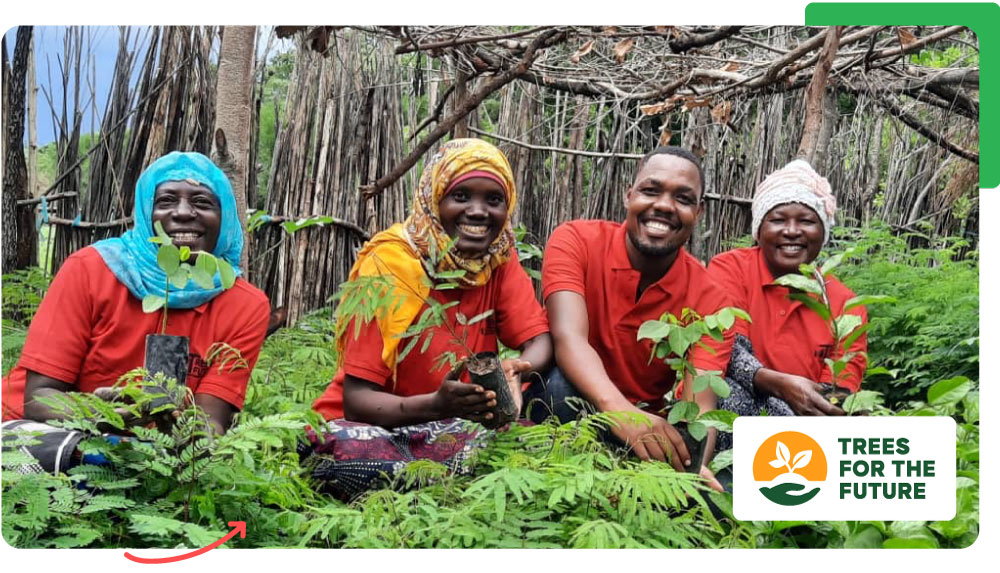
Trees for the Future has planted 250 million trees around the world since 1989. In recent years, they have been focusing on training farmers in sub-Saharan Africa in agroforestry and sustainable land use, so that they can grow vibrant regional economies, thriving food systems, and a healthier planet with tree gardens.
In partnership with Trees for the Future, since 2022, we have helped:
- Plant 13,760 trees – offsetting 1,100,770 lbs of CO2 for significant carbon footprint reduction
- Produce 51,599 lbs of organic produce to feed families and generate income
- Restore 216,714 sq ft of land
- And we’re just getting started!
trees planted - offsetting 1,100,770 lbs of CO2
lbs of organic produce to feed families and generate income
sq ft of land restored
Ready to grow sustainably?
Request a call with our sales team today for an expert consultation and custom eCommerce fulfillment proposal based on your unique business needs. Get started in as little as a week!

